Placemaking through C0-design processes: A Case Study of Jai Hind Camp, Delhi
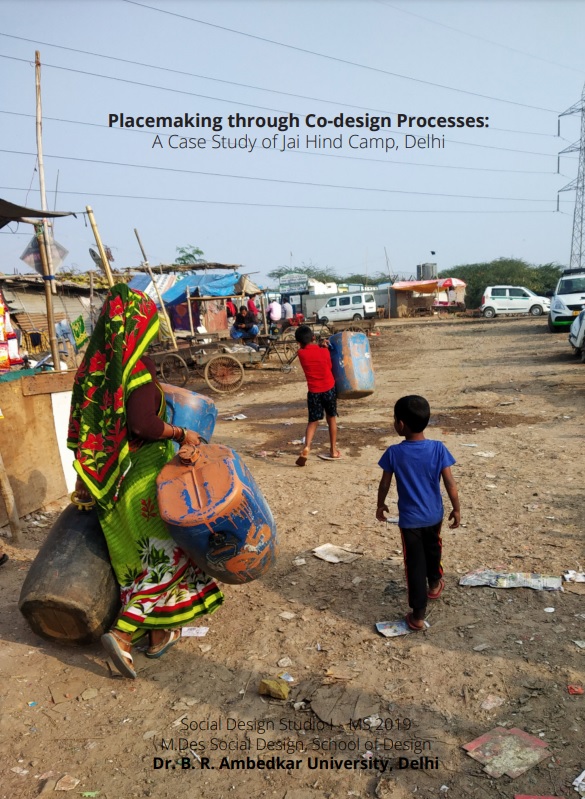 Placemaking through Co-Design processes: A Case Study of Jai Hind Camp, Delhi is a report authored by Dr Anandini Dar and Ms Divya Chopra (both ex faculty members of Dr B R Ambedkar University Delhi). This report is a product of an EU-ICSSR funded Project DWELL (Displacement, Placemaking and Wellbeing in the City). Dr Dar and Ms Chopra were part of the project team at AUD.
Placemaking through Co-Design processes: A Case Study of Jai Hind Camp, Delhi is a report authored by Dr Anandini Dar and Ms Divya Chopra (both ex faculty members of Dr B R Ambedkar University Delhi). This report is a product of an EU-ICSSR funded Project DWELL (Displacement, Placemaking and Wellbeing in the City). Dr Dar and Ms Chopra were part of the project team at AUD.
The first part of this report provides a brief outline of the social design studio offered as part of the MDes Social Design programme (2019) at the School of Design, AUD. The second half of the report features fifteen social design projects, ranging from spatial design interventions to introduction of new products and services within the site. These projects were co-created and co-designed by the students in collaboration with the resident community and faculty. Quoting from a section of the executive summary: "Given the practical nature of this Studio, students were particularly focused on developing prototype solutions for problems residents face in their everyday environments. Some of the projects you will read ahead ranged from design of educational services, formation of community groups, to prototypes of a toilet, playground, and pulley carts for water carriers. Across all projects it was evident that students developed prototypes and design solutions based on the needs of the “majority” residents."
This research and publication is a wonderful example of interdisciplinary social science work with policy implications collaboratively done by faculty and students of AUD, as part of a MDes Social Design Studio course. Published by Centre for Publishing, ISBN: 978-93-5895-863-8
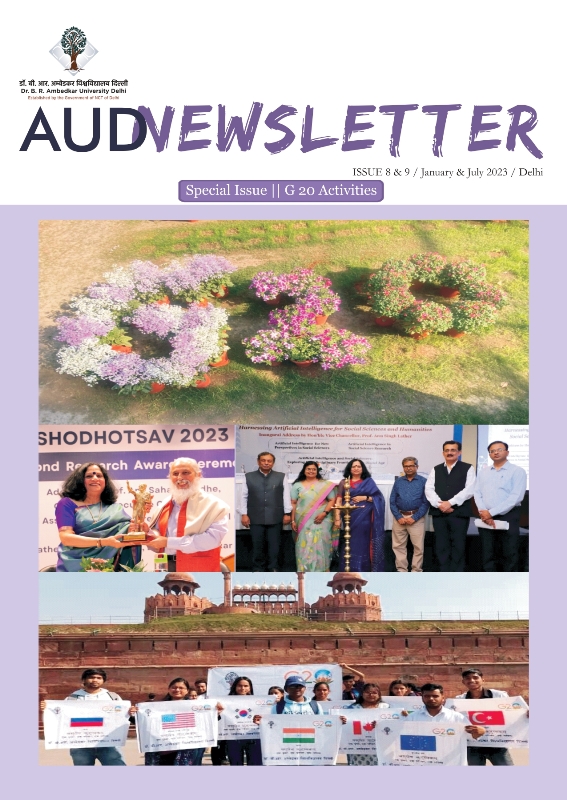 University Newsletter 8-9 January & July 2023 | Download
University Newsletter 8-9 January & July 2023 | Download
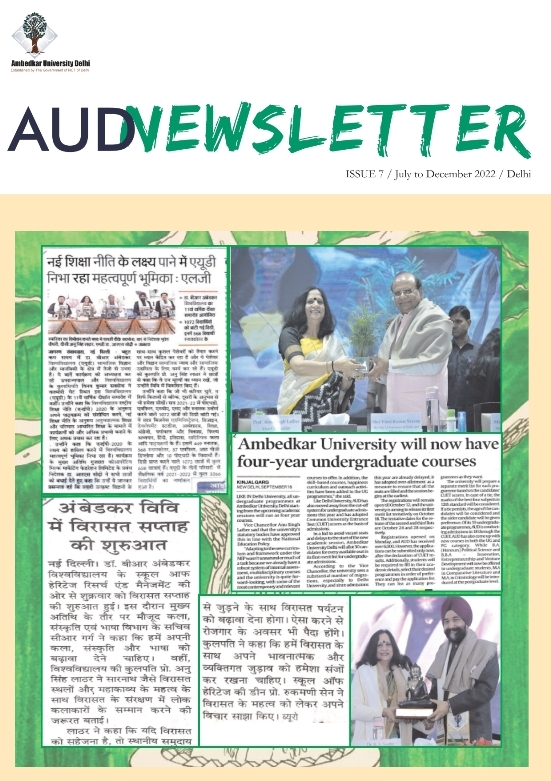 University Newsletter 7 January 2023 | Download
University Newsletter 7 January 2023 | Download
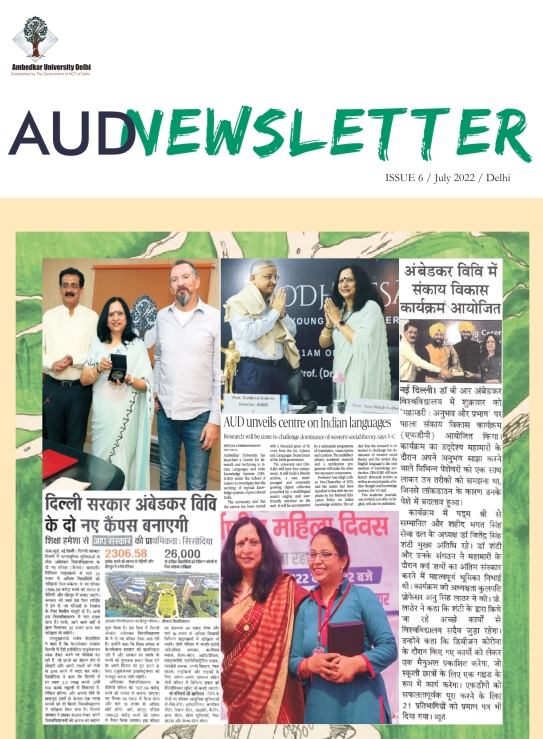 University Newsletter 6 July 2022 | Download
University Newsletter 6 July 2022 | Download
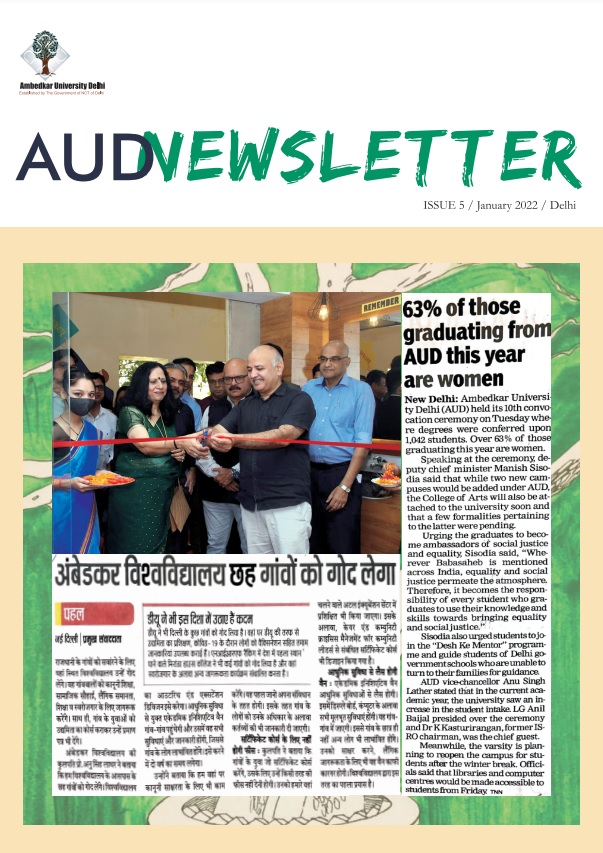 University Newsletter 5 January 2022 | Download
University Newsletter 5 January 2022 | Download
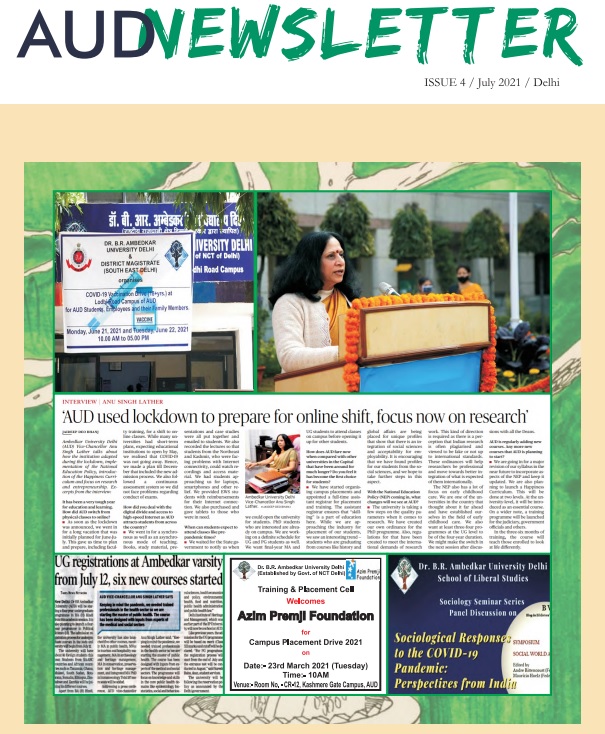 University Newsletter 4 July 2021 | Download
University Newsletter 4 July 2021 | Download
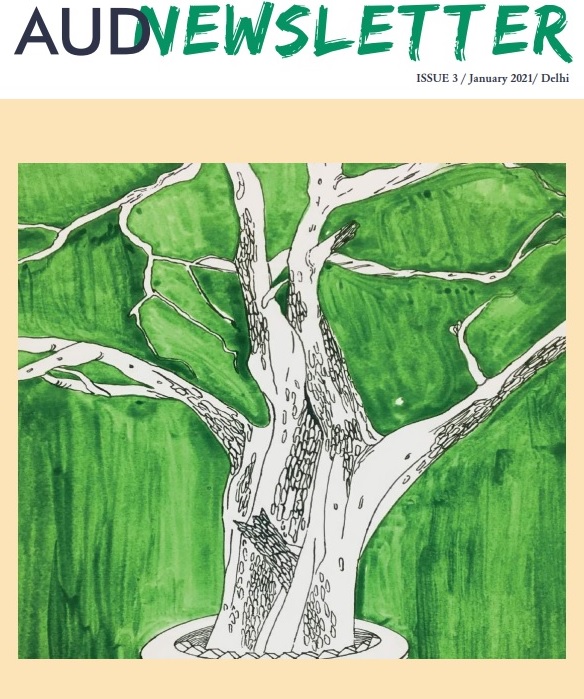 University Newsletter 3 January 2021 | Download
University Newsletter 3 January 2021 | Download
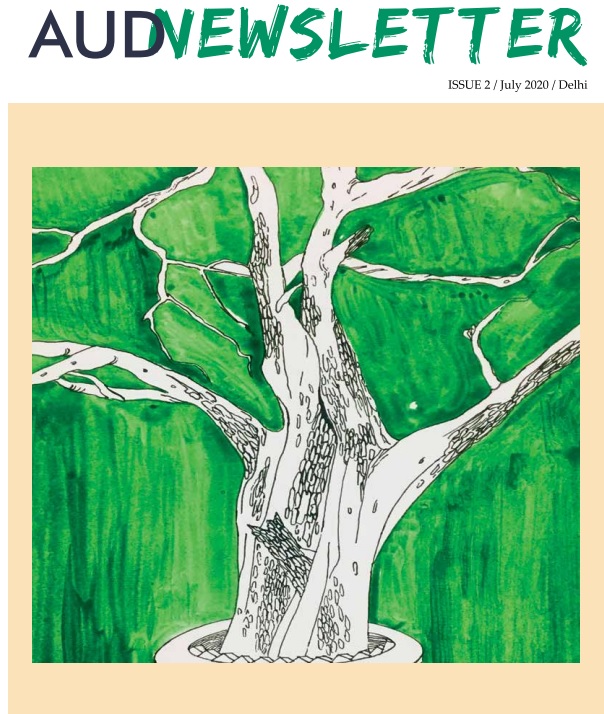 University Newsletter 2 July 2020 | Download
University Newsletter 2 July 2020 | Download
 University Newsletter 1 January 2019 | Download
University Newsletter 1 January 2019 | Download
 Utopia is a place or as it literally means, a no place, in Thomas More’s Greek pun,1 one that does not exist, cannot exist,2 but ideally should come into being as the good place, the Eutopia. Many utopian projects, be it beauty that never fades or the return to Eden, cannot be realized because nature does not permit them. But utopia was a dream, it provided orientation and hope, it allowed people to think that life could be beautiful, happy, just and inspiring rather than ugly, miserable, oppressive and squalid. The ideal was ahistorical and the vision was static; outside time, it did not belong to the past, the present, or the future; as a concept it was and is often still regarded as dogmatic and closed. As a place it was located beyond normal life, isolated and secluded, the better for creativity and purity free of the miasmas of our polluted world. It entailed more often than not an extraordinary journey to a remote abode, to an island far away, to a forgotten settlement in the empty steppe, to a remote mountain retreat.
Utopia is a place or as it literally means, a no place, in Thomas More’s Greek pun,1 one that does not exist, cannot exist,2 but ideally should come into being as the good place, the Eutopia. Many utopian projects, be it beauty that never fades or the return to Eden, cannot be realized because nature does not permit them. But utopia was a dream, it provided orientation and hope, it allowed people to think that life could be beautiful, happy, just and inspiring rather than ugly, miserable, oppressive and squalid. The ideal was ahistorical and the vision was static; outside time, it did not belong to the past, the present, or the future; as a concept it was and is often still regarded as dogmatic and closed. As a place it was located beyond normal life, isolated and secluded, the better for creativity and purity free of the miasmas of our polluted world. It entailed more often than not an extraordinary journey to a remote abode, to an island far away, to a forgotten settlement in the empty steppe, to a remote mountain retreat.
Author: Madhavan K. Palat, ISBN 987-81-932636-0-0
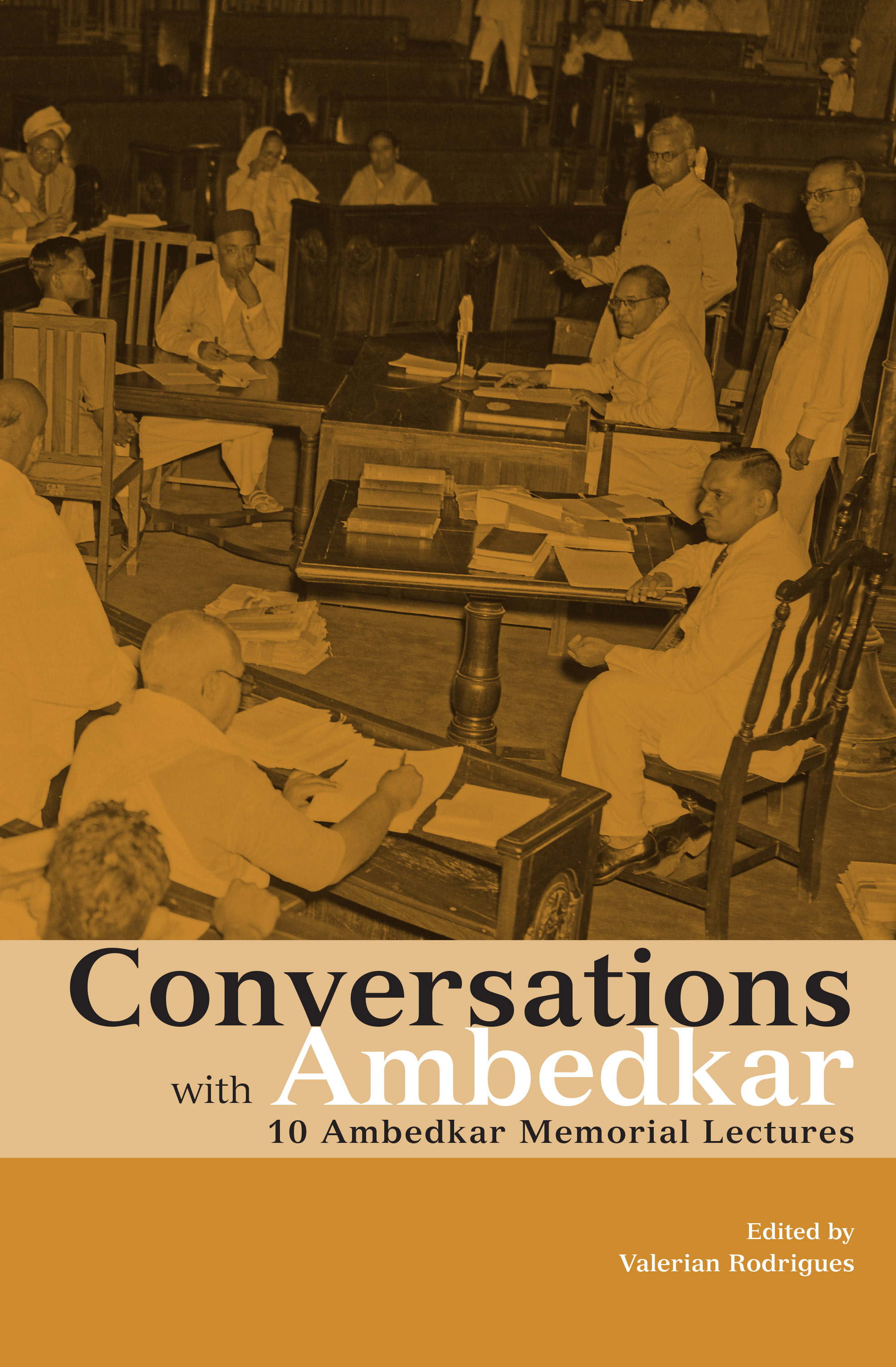 The lectures at Dr. B. R. Ambedkar University Delhi brought together in this volume dwell on some of the most telling concerns that our age confronts: concerns of justice, social closures, bare life and sovereign power, political agency, discrimination and affirmative action, displacement and migration, new modes and languages of command and control, social movements under the shadow of global capital, and politics of epistemic and normative frames on offer today. While several of the lectures take off from some of Dr. B.R. Ambedkar’s writings and interventions, others meet Ambedkar in shared concerns by remaining within the frame of their distinct academic specialisation or professional pursuits. The result is a deep conversation where scholarship and social concerns converge, begetting a complex tapestry of their own. The introduction to the volume, which highlights the distinctiveness of Ambedkar as a scholar and the scholarship that goes in his name, acts as a connecting thread to the themes and concerns mounted in these lectures. This volume is envisaged as the first in a series of dialogues with Ambedkar and his thought as embodied in the annual Dr B.R. Ambedkar Memorial Lecture series. The first ten lectures (2009–18) presented here mark the first decade in the life of Ambedkar University Delhi.
The lectures at Dr. B. R. Ambedkar University Delhi brought together in this volume dwell on some of the most telling concerns that our age confronts: concerns of justice, social closures, bare life and sovereign power, political agency, discrimination and affirmative action, displacement and migration, new modes and languages of command and control, social movements under the shadow of global capital, and politics of epistemic and normative frames on offer today. While several of the lectures take off from some of Dr. B.R. Ambedkar’s writings and interventions, others meet Ambedkar in shared concerns by remaining within the frame of their distinct academic specialisation or professional pursuits. The result is a deep conversation where scholarship and social concerns converge, begetting a complex tapestry of their own. The introduction to the volume, which highlights the distinctiveness of Ambedkar as a scholar and the scholarship that goes in his name, acts as a connecting thread to the themes and concerns mounted in these lectures. This volume is envisaged as the first in a series of dialogues with Ambedkar and his thought as embodied in the annual Dr B.R. Ambedkar Memorial Lecture series. The first ten lectures (2009–18) presented here mark the first decade in the life of Ambedkar University Delhi.
Valerian Rodrigues, the editor of the volume, is currently Ambedkar Chair, Dr. B. R.Ambedkar University Delhi. His recent books include The Essential Writings of B. R. Ambedkar (2002), The Indian Parliament: A Democracy at Work (2011, co-authored with B. L. Shankar), and Speaking for Karnataka (2018, co-authored with Rajendra Chenni, Nataraj Huliyar and S. Japhet). He served as a member of the Advisory Committee for the international conference, ‘Quest for Equity: Reclaiming Social Justice, Revisiting Ambedkar’, held in Bangalore during 21–23 July 2017.
Contributors to the volume: Upendra Baxi, Homi K. Bhabha, Veena Das, Gopalkrishna Gandhi, Gopal Guru, Ashis Nandy, Deepak Nayyar, Bhikhu Parekh, Aruna Roy, Romila Thapar
Edited by Valerian Rodrigues Foreword by Shyam B. Menon
Published by Dr. B. R. Ambedkar University Delhi in association with Tulika Books. Social Science • February 2019 • 6.25 x 9.5 inches • (xiv+254) 268 pages • Hardback • ISBN: 978-81-937329-5-3 • Rs 750